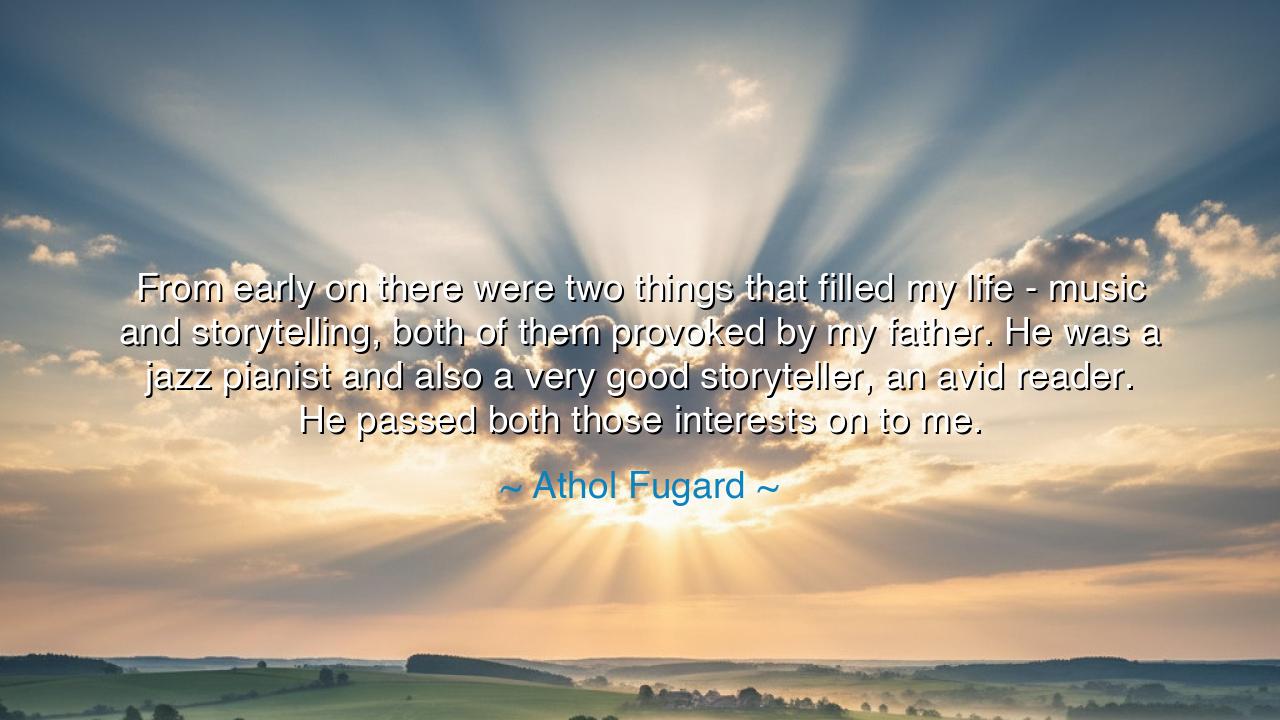
From early on there were two things that filled my life - music
From early on there were two things that filled my life - music and storytelling, both of them provoked by my father. He was a jazz pianist and also a very good storyteller, an avid reader. He passed both those interests on to me.






Hear the words of Athol Fugard, the playwright of conscience, who declared: “From early on there were two things that filled my life – music and storytelling, both of them provoked by my father. He was a jazz pianist and also a very good storyteller, an avid reader. He passed both those interests on to me.” These words speak not only of inheritance, but of the eternal flame that passes from one soul to another, a flame that shapes destiny and binds generations together. For in music and in storytelling, man finds his two oldest companions: one that stirs the heart without words, and one that weaves words into eternal meaning.
From the dawn of time, humanity has lived in rhythm and tale. The beating of drums around ancient fires was music—the heartbeat of a tribe, uniting them in courage, in mourning, in joy. And the voices of the elders, speaking of gods and heroes, were stories—threads that bound people to their past, to their values, to their very souls. Fugard’s father, in his role as both pianist and teller of tales, carried the same ancient mantle, passing it to his son as the shamans of old passed wisdom to their heirs. Thus, the playwright’s art was born not of solitary genius, but of inheritance—a lineage of spirit.
Consider the story of Homer, the blind poet of Greece. It is said he wandered from town to town, reciting the Iliad and the Odyssey. He may not have invented all the stories, but he carried them from his fathers and gave them form through his tongue. In the same way, Athol Fugard bore the legacy of his father, who taught him to listen to the rhythm of jazz and the rhythm of a well-spun tale. The one filled his heart with cadence, the other with meaning. Together, they became the foundation upon which he built his voice as a writer, a playwright, a prophet of truth.
The lesson in this quote is clear: no soul is born alone into its genius. What we are is shaped by those who came before us. Parents, teachers, mentors, even the strangers we admire—all of them place seeds in our spirit. Some give us the rhythm of music, others the power of storytelling, still others the discipline of thought or the fire of courage. Our task is to receive these seeds, to let them grow, and in time, to pass them on to others.
But beware, O listener, of neglecting the gifts you have inherited. Too many take lightly the wisdom and passions given to them by their elders. Fugard did not. He took the jazz his father loved, and the stories his father spun, and forged them into plays that gave voice to the oppressed in South Africa. Through art, he resisted silence. Through rhythm and word, he gave hope. His inheritance became his weapon, his offering, his truth. So too must we carry forth what has been entrusted to us—not burying it, but enlarging it.
Practical action lies before us: honor your inheritance. Reflect on what your elders, your family, your teachers, or even your culture has given you. Is it discipline? Compassion? A love of language? A song, a craft, a memory? Do not let these gifts lie dormant. Write them, sing them, live them. For in so doing, you keep alive not only your own spirit, but also the spirits of those who came before you.
And so let us remember Fugard’s testimony: music and storytelling, father and son, inheritance and destiny. These are not small things, but eternal forces that shape the soul. If we embrace the gifts passed to us and nurture them, then we too shall pass them forward. And when we are gone, others will speak of us as we now speak of him: not as one who lived alone, but as one who carried the flame, and gave it to the next generation.






AAdministratorAdministrator
Welcome, honored guests. Please leave a comment, we will respond soon